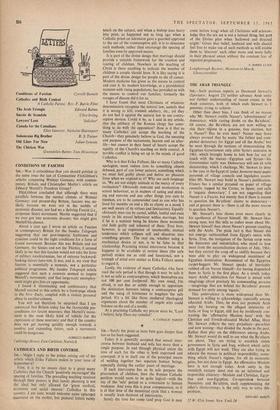THE ARAB TRIANGLE
SIR,—Such partisan reports as Desmond Stewart's (Spectator, August 23) neither advance Arab unity nor further underStanding of recent events in the Arab countries, both of which ends Stewart is, 1 presume, trying to achieve.
Other than sheer bias, I can think of no reason why Mr. Stewart credits Nasser's 'advertisement' of democracy, while casting doubt on the Ba'athists'. Of course, the Ba'athists are not now willing to risk their regime in a genuine, free election, but is Nasser? Has he ever been? Nasser may have always avowed that he wants 'the fullest and corn- pletest dpmocracy for Egypt and all the Arabs,' but he went through the motions of democratising the - Egyptian .Government only after Syria's secession in 1961, which brought home to him how far out of touch with the masses—Egyptian and Syrian—his Government really was. Democracy will not sit with dictatorship, which I challenge Mr. Stewart to deny is the case in the Egypt of today, however many paper pyramids of village councils and legislative assem- blies Mr. Stewart may build in Nasser's justification. Franco has a similar pyramid on paper of village councils, topped by the Cortes, in Spain, and calls it 'organic democracy.' I am not suggesting that Nasser is a Fascist, but merely that if' there is reason to question the Ba'athists' claims to democracy— and at present there is—there is all the more reason to question Nasser's.
Mr. Stewart's bias shows even more clearly in his apotheosis of Nasser himself. Mr. Stewart likes strong men; but this tells us rather more about Mr. Stewart himself than about Nasser's present standing with the Arabs. The plain fact is that Nasser did not emerge unblemished from Egypt's union with Syria. True, the instigators of the Syrian coup were the financiers and industrialists who stood to lose most from the nationalisation decrees of July, 1961; but they carried the coup off so swiftly because they were able to play on widespread resentment of Egyptian domination. Resentment of the Egyptian carpet-baggers Mr. Stewart speaks of inevitably rubbed off on Nasser himself—for having dispatched them to Syria in the first place. As a result, today many Arabs' admiration for Nasser is mixed with misgivings about precisely his commanding persona —misgivings that are behind the Ba'athists' present demand for unity among 'equals.'
This ambivalence is more widespread than Mr. Stewart is willing to acknowledge, especially among educated Arabs. Thus, he does not promote Arab unity by harping on the alleged inferiority of Syria or Iraq to Egypt, still less by invidiously con- trasting the 'affirmative Moslem hero' with the Christian and French-educated Michel Aflaq. Here Mr. Stewart reflects the very prejudices—parochial and now waning—that divided the Arabs in the past. Rather than play on the differences among Arabs, Mr. Stewart would do well to see what the Ba'athists are about. They are trying to establish stable government in Syria and Iraq, without which unity with Egypt Will not work. They are also trying to educate the masses in political responsibility, some- thing which Nasser's regime, for all its economic gains, has not done in Egypt. An affirmative Moslem hero is not enough today. Arab unity in the twentieth century must rest on an informed and responsible citizenry—Moslem and Christian, Egyp- tian and non-Egyptian. Co-operation between Nasserists and Ba'athists, each supplementing the other's shortcomings, is the only way to solve this problem..






























 Previous page
Previous page